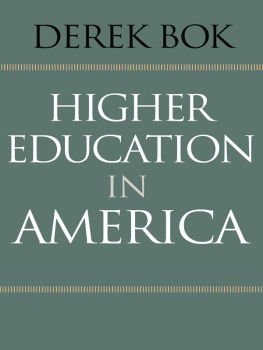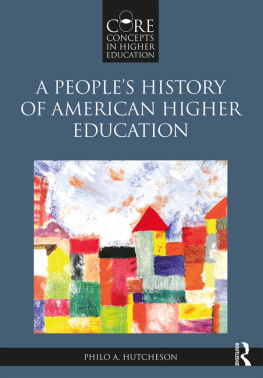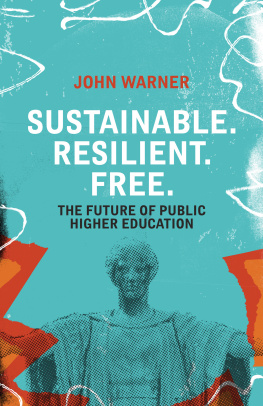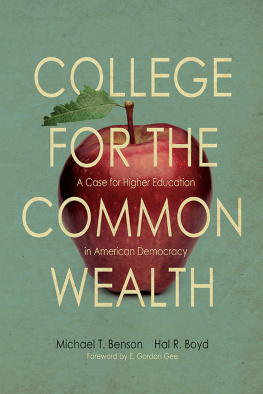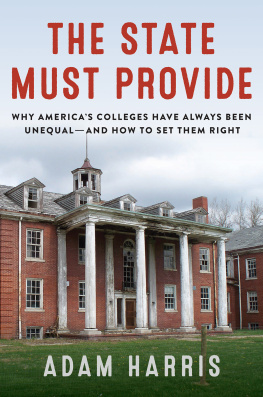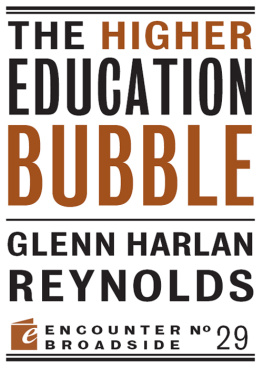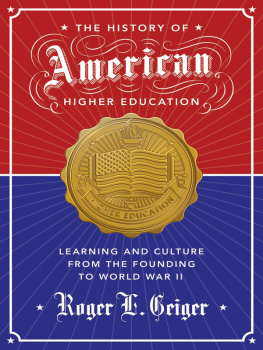
HIGHER EDUCATION IN AMERICA
DEREK BOK
HIGHER EDUCATION IN AMERICA
PRINCETON UNIVERSITY PRESS
RINCETON AND OXFORD
Copyright 2013 by Princeton University Press
Published by Princeton University Press, 41 William Street, Princeton,
New Jersey 08540
In the United Kingdom: Princeton University Press, 6 Oxford Street,
Woodstock, Oxfordshire OX20 1TW
press.princeton.edu
All Rights Reserved
Library of Congress Cataloging-in-Publication Data
Bok, Derek Curtis.
Higher education in America / Derek Bok.
pages cm.
Includes bibliographical references and index.
ISBN 978-0-691-15914-0 (hardcover : alk. paper) 1. Education, HigherUnited StatesHistory. 2. Education, HigherAims and objectivesUnited StatesHistory. 3. Universities and collegesUnited StatesHistory. 4. Professional educationUnited StatesHistory. I. Title.
LA227.4.B665 2013
378.73dc23
2013013887
British Library Cataloging-in-Publication Data is available
This book has been composed in Minion Pro and Trajan Pro
Printed on acid-free paper.
Printed in the United States of America
1 3 5 7 9 10 8 6 4 2
TO CAMERON AND NICHOLAS AND ERIK AND ANNIKA
CONTENTS
ACKNOWLEDGMENTS
Writing this book led me into many areas of higher education with which I had no direct experience. I might never have attempted such a task had I not been able to seek the counsel of a variety of friends and colleagues. A number of them kindly read particular chapters and offered valuable comments: Sandy Baum, Hilary Bok, Joe Bower, Bill Fitzsimmons, David Garvin, Elizabeth Huidekoper, Andy Kaufman, Rakesh Khurana, David Korn, Richard Light, Mike McPherson, Martha Minow, Vel Nair, David Nathan, John Simon, and Lloyd Weinreb.
Bob Atwell, a longtime comrade-in-arms from our days working together at the American Council on Education, read all of and offered many helpful comments. My close friend and colleague Henry Rosovsky read the entire manuscript and commented with rare insight, not only on what I wrote but on how I expressed my thoughts. To another old and dear friend, Bill Bowen, I owe a special debt for going far beyond the call of duty to assist me. Not only did he read the entire manuscript with meticulous care and share a number of valuable unpublished reports about online education. He even arranged for me to have the help of his assistant, Johanna Brownell, who lent her formidable editorial skills to the manuscript and supplied me with a host of useful articles and studies to fill various gaps in the text.
I am also indebted to the three outside readers enlisted by the Princeton University Press. Each of them clearly worked hard to provide me with detailed suggestions to improve what I had written. In making this assistance possibleand in much else as wellthe Press has given me guidance and encouragement throughout. Lauren Lepow unerringly ferreted out my grammatical mistakes and improved my prose. My longtime editor, Peter Dougherty, helped in numerous ways, great and small. I could not ask for more of any publisher.
As always, I owe a great debt to my assistant, Connie Higgins, who has done everything from typing and retyping endless drafts to checking footnotes, finding innumerable books and articles, extracting little-known reports from distant offices and government agencies, and even supplying me with newspaper columns she discovered that she thought might be of use. It would have been quite impossible for me to complete this book without her help.
Finally, I am particularly grateful to Sissela, who has read the entire manuscript several times and offered candid comments on matters of tone and style that even good friends might hesitate to make. From start to finish, she has been a constant source of encouragement. For more than fifty years, she has helped to make writing a joy and not merely an occupation.
HIGHER EDUCATION IN AMERICA
INTRODUCTION
In the modern world, colleges and universities have assumed an importance far beyond their role in earlier times. They are now the countrys chief supplier of three ingredients essential to national progressnew discoveries in science, technology, and other fields of inquiry; expert knowledge of the kind essential to the work of most important institutions; and well-trained adults with the skills required to practice the professions, manage a wide variety of organizations, and perform an increasing proportion of the more demanding jobs in an advanced, technologically sophisticated economy. In addition, they help to strengthen our democracy by educating its future leaders, preparing students to be active, knowledgeable citizens, and offering informed critiques of government programs and policies. Not least, they supply the knowledge and ideas that create new industries, protect us from disease, preserve and enrich our culture, and inform us about our history, our environment, our society, and ourselves.
Because of the essential role that colleges and universities play, almost everyone has a stake in having them perform well. By several measures, they have succeeded handsomely. In a recent ranking compiled by a group of Chinese scholars, all but three of the twenty highest-rated universities in the world were located in the United States.and economics since World War II did their most important work while serving on faculties in this country. Our colleges and graduate schools have long been the destination of choice for students around the world who have the chance to study outside their own country. Because of these achievements, more and more nations are adapting their systems of higher education to conform more closely to our model.
The worldwide respect accorded to American higher education should be a source of satisfaction to many people, not least to those who work in the academy. Ironically, however, this newfound prominence has brought many problems in its wake. No longer are colleges and universities left to function more or less as they please. As they have grown in size and importance, they have attracted closer scrutiny from each of the constituencies affected by their performance. State legislators want to know what taxpayers and parents are getting for all the money spent on public higher education. Politicians and media commentators pay attention to what colleges are teaching and to the ideas of professors on matters of public concern. Employers ask whether the students graduating from our colleges and professional schools are well enough trained for the jobs they are hired to do. Communities take an increasing interest in what universities are contributing to the local economy and wonder whether they should pay more taxes to the cities and towns in which they sit.
This added attention has produced a bumper crop of complaints. Whatever the world may think about the quality of American colleges and universities, the public here at home is far from satisfied. Parents feel that tuitions are too high and that too little is done to hold down costs. Their children struggle to repay the loans incurred to pay for their college education. Legislators complain of waste and inefficiency, of low graduation rates, of a reluctance to be held accountable for performance. Employers grumble that far too many graduates cannot write clearly, think analytically, work collaboratively, deal with other people effectively, or observe proper ethical standards. Conservatives charge that faculties display a marked liberal bias, while critics on the left insist that universities are too beholden to corporate interests. Meanwhile, editorial writers chastise college presidents for lacking a vision for their institutions or a clear voice of wisdom on issues of national concern.
Next page
